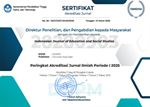Abdelfattah, F. (2023). Reviewing the critical challenges that influence the adoption of the e-learning system in higher educational institutions in the era of the COVID-19 pandemic. Online Information Review, 47(7), 1225–1247. https://doi.org/10.1108/OIR-02-2022-0085
Adeoye, M. A. (2025). Integration of Islamic Thought and Scientific Knowledge in the Formation of Educational Institution Leadership. TATHO: International Journal of Islamic Thought and Sciences, 141–152. https://doi.org/10.70512/tatho.v2i2.85
Adeoye, M. A., & Munawwaroh, I. (2025). Transformational Leadership in Education: Harmonising Accountability, Innovation and Global Citizenship. Kharisma: Jurnal Administrasi Dan Manajemen Pendidikan, 4(1), 14–30. https://doi.org/10.59373/kharisma.v4i1.68
Adeoye, M. A., Widiana, I. W., & Shofwan, I. (2025). Optimising Video Conferencing Tools for Educational Leadership: Enhancing Virtual Collaboration and Leadership Skills Development Theoretically. An-Najmu: Jurnal Manajemen Pendidikan Islam, 2(01), 37–52.
Ahn, Y., & Bessiere, J. (2022). The role of participative leadership in empowerment and resident participation. Sustainability, 14(18), 11223. https://doi.org/10.3390/su141811223
Aprilita, B. (2012). Dimensi-Dimensi Gaya Kepemimpinan Bass Dan Avolio Menurut Persepsi Karyawan Dalam Membangun Gaya Kepemimpinan Yang Efektif (Studi Pada Bank BRI Cabang Wates).
Ataman, A., Sanjani, M. A. F., & Safitri, S. D. (2024). Exploring Complementary Leadership Styles in Madrasahs by Aiming at Their Impact on Integrity and Character Development. Business and Applied Management Journal, 1(2), 118–133. https://doi.org/10.61987/bamj.v1i2.487
Attahakul, P. (2025). Education’s Role in Creating a Sustainable and Equitable Society. Journal of Asian Language Teaching and Learning (Online), 6(1), 81–93.
Basri, H., Manshur, U., Zaini, A. W., & Suhermanto, S. (2024). Exploring Charismatic Leadership and Personality Competence: Keys to Fostering Teacher Motivation: English. Bidayatuna Jurnal Pendidikan Guru Mandrasah Ibtidaiyah, 7(2), 109–120.
Diana, E., & Sain, Z. H. (2025). Quality Control Emotions: Strategies for Managing Student Stress in Higher Education. Journal of Psychological Insight, 1(1), 1–11.
Hefniy, H., Diana, E., & Imam, O. A. (2025). The Utilization Artificial Intelligence to Recruitment the Best Educational Talent. Indonesian Journal of Artificial Intelligence (IJAI), 1(1), 12–23.
Hilton, S. K., Arkorful, H., & Martins, A. (2021). Democratic leadership and organizational performance: the moderating effect of contingent reward. Management Research Review, 44(7), 1042–1058. https://doi.org/10.1108/MRR-04-2020-0237
Hoang, G. (2021). Leaders influencing innovation: A qualitative study exploring the role of leadership and organizational climate in Vietnamese tourism SMEs. Employee Relations: The International Journal, 43(2), 416–437. https://doi.org/10.1108/ER-07-2019-0279
Hyseni Duraku, Z., & Hoxha, L. (2021). Impact of transformational and transactional attributes of school principal leadership on teachers’ motivation for work. Frontiers in Education, 6, 659919. https://doi.org/10.3389/feduc.2021.659919
Lateh, M. (2023). Building Sustainable Nonprofit Organizations Through Effective Financial Management. 01(01), 11–22.
Pada, A., Sahabuddin, E. S., & Amir, F. (2024). Reviewing the Quality of Indonesian Social Education in the Era of Globalization. Contemp. Readings L. & Soc. Just., 16, 841.
Qushwa, F. G. (2024). Patronage of Kyai Leadership in Building Parental Choice in Islamic Boarding Schools. Mapendis: Jurnal Manajemen Pendidikan Islam, 2(1), 44–56.
Ramly, M., Basalamah, S., & Bunyamin, A. (2024). Performance Enhancement Of Madrasah Teachers’: A Structural Equation Model. Revista de Gestao Social e Ambiental, 18(2), 1–12. https://doi.org/10.24857/rgsa.v18n2-067
Samsul, Z. H. S. (2025). Quality Control in HR Management: Ensuring Accreditation in Higher Education. Evaluasi: Jurnal Manajemen Pendidikan Islam, 9(1), 142–158. https://doi.org/10.32478/essysg79
Sugiyono. (2023). Motede Penelitian Kuantitatif Kualitatif dan R&D (5th ed.). ALFABETA.
Sulistyastuti., E. A. P. dan D. R. (2007). Metode Penelitian Kualitatif (1st ed.). Penerbit Gaya Media.
Suryadi, I. (2023). Peran Kepemimpinan Efektif dalam Meningkatkan Kualitas Manajemen Pendidikan. Journal Of International Multidisciplinary Research, 1(2), 129–145.
Thohir, P. F. D. M. (2024). Strengthening the Reputation of Islamic Boarding Schools: The Role of Leadership, Educational Innovation, and Local Wisdom. Managere: Indonesian Journal of Educational Management, 6(3), 331–346. https://doi.org/10.52627/managere.v6i3.720
Tohet, M. (2024). Gender Awareness in Building Self-Efficacy in Student Organization Leadership at School. Journal of Educational Management Research, 3(1), 71–84.
Walid, M., Budianto, L., Rohmana, W. I. M., Wahyuni, E. N., Ali, N., & Uyun, F. (2025). Caring leadership as a leading factor in cultivating the research culture: Evidence from Islamic higher education. Cogent Education, 12(1), 2480485. https://doi.org/10.1080/2331186X.2025.2480485
Wang, Q., Hou, H., & Li, Z. (2022). Participative leadership: a literature review and prospects for future research. Frontiers in Psychology, 13, 924357. https://doi.org/10.3389/fpsyg.2022.924357
Wang, X., Liu, Y., Peng, Z., Li, B., Liang, Q., Liao, S., & Liu, M. (2024). Situational leadership theory in nursing management: a scoping review. BMC Nursing, 23(1), 930. https://doi.org/10.1186/s12912-024-02582-9
Zhang, H., & Tian, M. (2025). Unpacking the multi-dimensional nature of teacher competencies: a systematic review. Scandinavian Journal of Educational Research, 69(5), 1004–1025. https://doi.org/10.1080/00313831.2024.2369867
Zunidar. (2022). Kepemimpinan Transaksional: Model Kontemporer Dalam Memimpin Lembaga Pendidikan Islam. Ar-Raniry, 208–216.
 (Universitas Islam Negeri Sultan Aji Muhammad Idris Samarinda)
(Universitas Islam Negeri Sultan Aji Muhammad Idris Samarinda) 



